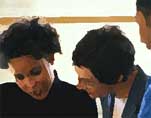Interview with Sarah PulliePresidential Award for Elementary Mathematics Teaching, 2001 |
 |
Sarah currently teaches third grade mathematics and science at Latta Elementary School in Latta, South Carolina. She talks here about her experiences in community outreach. One disappointment led to ultimate success on a teaching project and to the discovery that the community can be a place of support.
How did you get started in establishing community partnerships?
I had wanted to build a butterfly garden at my school and wrote a grant to do so, but it didn’t get funded. My principal supported my idea, though, and connected me with the Butterfly Garden Project at Clemson University. I started attending meetings with this statewide project and was provided with seed money to begin a small butterfly garden. I reworked the original grant and sent it to the South Carolina Science Council for a members-only grant. This funding enabled me to enlarge the garden as well as provided tools and a drip irrigation system. Then I went to our local garden club to present my idea and asked for plant donations, which they were happy to make.
After I received my Presidential Award and went to Washington, our Rotary Club invited me to come present about my trip and my work. I took examples of third-grade math work and the state standards, so they could see what my students were doing. They were shocked to learn what students in third-grade math are expected to know! Since our community is small, I have the opportunity to meet with various members of the Rotary Club throughout the year. Some members of the Rotary Club even visit my classroom on a regular basis.
As a result of my active role with science education, I was asked to be a member of the Education Advisory Board for ScienceSouth. At present, ScienceSouth brings various presentations to schools for teachers. In some of the sessions, students are active participants. In the summer, teachers can attend a three-day camp to learn a variety of activities to use with their students. Students attend the third day, so teachers have the opportunity to test their new skills. Future plans are for a permanent site that will be open to schools and the general public.
What advice would you give to a teacher who wants to establish a community partnership?
I would tell her or him to be persistent—if you have an idea and want help from an organization, ask! Let the organization know that by helping you, they can help themselves—many community organizations have educational goals as part of their mission. Use the local newspaper to give you visibility in the community. Join professional organizations—membership often gives you access to listservs and links to resources. For example, as a member of the South Carolina Science Council, I was eligible to apply for a grant.
Do you have any advice for teachers who want to connect more with parents in these types of programs?
Although we haven’t done it yet, the third-grade teachers at my school plan to send home a “time and talent” survey to find out what skills and resources are available from our parents and families. For example, the grandmother of one of my students owns a local nursery, which could be a great resource for our butterfly garden study. Other family members could be asked to speak to our classes about their jobs.
What advice would you give to a teacher about getting financial support for community programs?
I would recommend taking the grant route: you can write a grant and then tweak it for different applications. For example, I tweaked a $2,000 grant that didn’t get funded into a $1,000 grant that did. With our butterfly garden, we also made use of in-kind donations. For example, a lot of people would prefer to give plant cuttings instead of money. Our high school has an agriculture class and we have worked out a swap: I give them seeds, which they plant and cultivate, and they give me the plants in return. By doing this, our high school can use this as a servicelearning project, so everyone wins.
What advice would you give a teacher looking for support from local businesses?
Where we are, we don’t have many local businesses, so those that we have are asked to do a lot. I think that appealing to the business to make a donation of goods as a tax deduction, or selling to you wholesale, or supplementing their donation with a grant, are all ways to circumvent looking like you always have your hand out.
How do you juggle your teaching responsibilities with the community partnerships?
I do some of my community work (like talking to the Rotary Club) in the summer when I have more time; on the other hand, sometimes it makes more sense to do it during the school year when my students motivate me to reach out. I’ve found that listservs and professional organizations give you lots of lead time on deadlines of grant applications, so you can plan your time. I also stay busy all the time!
How do you think your experience with community partnerships contributes to the advancement of science and math reform?
So much of science is doing science, rather than reading about science. The butterfly garden, which is the result of community partnerships, is a place where students can do real science: studying plant life cycles, collecting data, writing up what they have done. They get a chance to do real science, and they remember it.
With the Rotary Club, I helped them understand what the state math standards for learning are, and how our work with students in the classroom meets those standards. That helps build the community support for reform.
If you have any questions you would like to ask Sarah Pullie about her experiences reaching out to the community, contact her at spullie@mail.dillon3.k12.sc.us.

